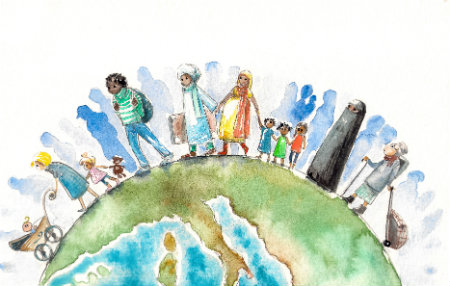Migrants and Displaced Persons
According to the United Nations, the number of migrants – persons living in a country other than where they were born – worldwide reached 281 million in 2020. Of these, there are approximately 82.4 million people forcibly displaced. Within that number, 26.4 million (32%) are considered refugees, and 35 million (42%) are children under the age of 18. About half are women and girls. The issue of immigration brings with it complex social and political concerns, which the Global Alliance addresses in light of our unique lens: the intersection of social justice, behavioral health, and human rights at the individual, systemic, and population levels. When it comes to the issue of immigration, we are engaged in advocating for immigration reform within the United States and committed to protecting the human rights and promoting behavioral health and well-being for all migrants and displaced persons. U.S. Immigration ReformApproximately 44.9 million immigrants, about 13.7% of the country's population, lived in the United States as of 2019. With each wave of immigrants that arrives, political and social debates arise, and immigration policies change with each new administration. We want to remain on the forefront of advocating for policy reform that reflects our organizational priorities. In 2010, the Global Alliance adopted a position statement on the impact of immigration enforcement on children and families. The statement calls for the development of comprehensive immigration reform legislation that incorporates family-centered policies which promote family unity. Subsequent work has continued to emphasize the need for immigration policies to protect children and prioritize families. In June 2021, for example, we released two policy resolutions addressing flaws in the asylum-seeking process in the U.S. – one advocating for quick and comprehensive family reunification and the other calling for the protection of human rights and dignity for families seeking asylum. Promoting behavioral health and well-beingRefugees and others forcibly displaced from their homes are at higher risk for developing mental health conditions due to previous trauma, such as war, violence, poverty, and/or the stress of migration. Moreover, once refugees arrive at camps or their host countries, they often face adverse situations and ongoing stressors, which also affect their mental health. Forced migration requires multiple adaptations in short periods of time. People – especially, but not only, children – become more vulnerable to abuse and neglect. Pre-existing social and mental health problems can be exacerbated. For example, if the reception of refugees and the provision of protection and assistance undermine human dignity, discourage mutual support, and/or create dependency, mental health problems may be induced or aggravated. An acute sense of urgency among people on the move may prompt them to take extreme medical and psychosocial risks, and their fast-paced mobility through several countries leaves little time for health care. Learn more about our work
Additional resources
What can you do?
|

 People immigrate for a variety of reasons. Sometimes they leave their country of origin or residence by choice. Other times, they flee as refugees or are forcibly displaced by violence, persecution, economic instability, food insecurity, and/or climate change.
People immigrate for a variety of reasons. Sometimes they leave their country of origin or residence by choice. Other times, they flee as refugees or are forcibly displaced by violence, persecution, economic instability, food insecurity, and/or climate change.